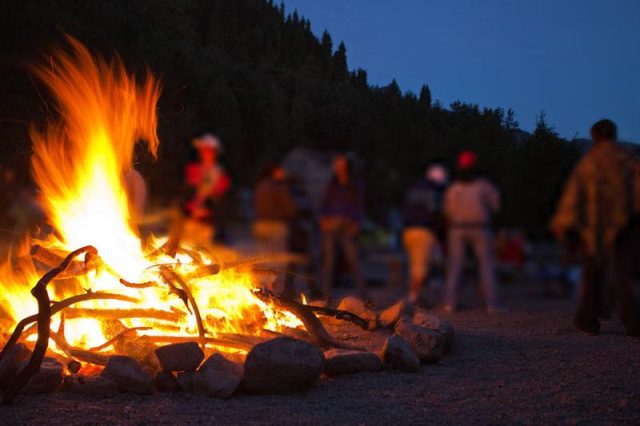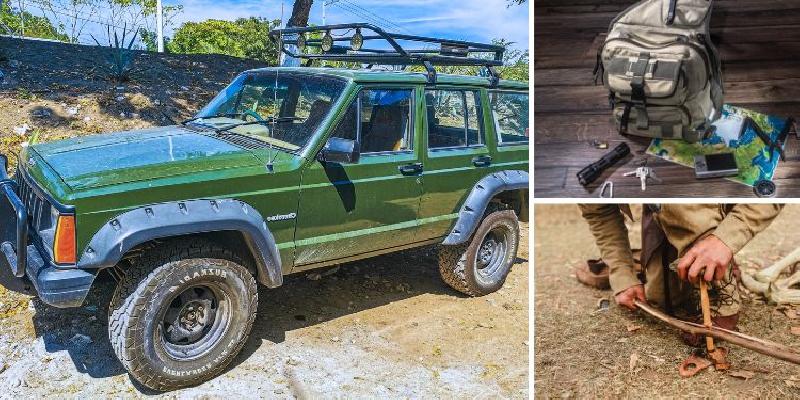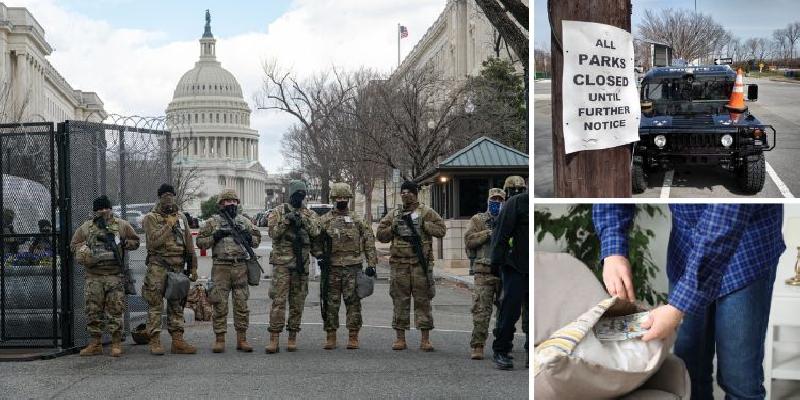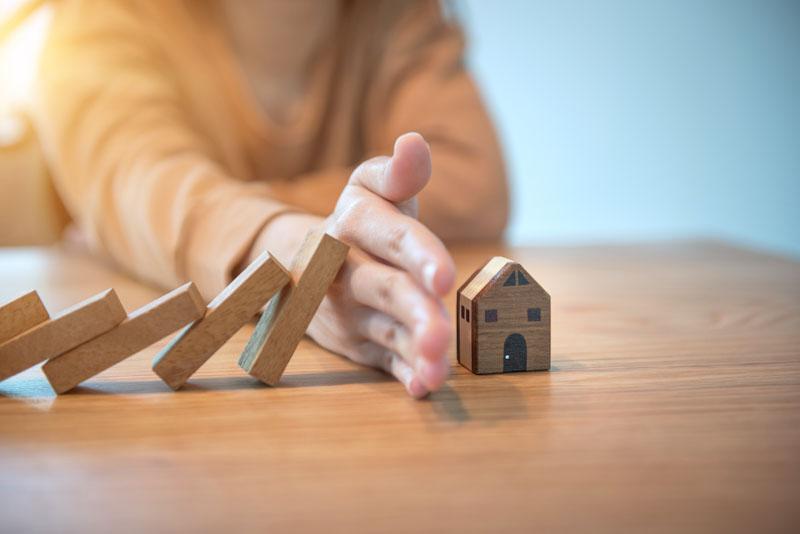It’s standard fare in the prepping community that we say we won’t let anyone in, once we’re in survival mode. We prepare for our family’s needs, and we don’t really have enough food to take care of friends, neighbors, or even family members. That’s now… but what about when a disaster happens?
The truth of the matter is that it will be very hard to say “No!” to family members or even friends, should they come knocking on our doors during a time of crisis. We may think that we’ll turn them away, or maybe get them to leave by offering them a little food; but it won’t be that easy. In many cases, their survival plan, if they have one at all, is to depend on us; even if we’ve already told them they can’t.
Fortunately for me, my family lives a couple of states away; so, there’s little chance of them showing up at my door. On the other hand, my wife’s mother and brother live in the next town over, close enough that they could easily drive here to be with us. And I’m sure there’s no way that my wife would say no to either of them. She’s more likely to go pick them up and bring them to our home, if there looks like there’s going to be any sort of a problem. She did that the last hurricane, so why would I expect anything different for the next problem?
I suppose there are some of you out there, who will succeed in keeping their families out of their house, in the wake of a disaster. If you can do that, without alienating your own spouse, more power to you. For the rest of us, I think we may need to start thinking about how we are going to manage our survival plan, with all those extra people in our homes.
For that matter, those of us who have survival teams need to think about that a bit too. Most preppers’ survival teams are scattered all over town, not living together on one street. That means that in a time of crisis, when they need to be working together, they won’t be close enough together to help each other out. About the only way they’ll be able to work together for their mutual benefit, is to come together in one location, probably the largest house that any of the team owns.
My personal survival plans used to include my children returning home, with their families, in a time of disaster. For that reason, we didn’t “downsize” when the kids moved out. Things have changed since then and I no longer live in the same city as my kids; but we can still bed everyone down, when they come for the holidays.
So, the real question for all of us, is how are we going to manage with all those extra people in our homes?
Put Everyone to Work
Having extra people around to help with all the survival tasks isn’t all bad. There’s always a lot to do in any survival situation; more than you can handle yourself. Put those extra bodies to work, under the premise “If you don’t work, you don’t eat.”
Remember, these aren’t skilled survivalists, so you’ll probably have to train them how to do anything you need them to do. For that matter, you’re going to have to train them on everything, from how to use the toilet, when there’s no running water, to how to conserve water so there’s enough for drinking and cooking. Don’t expect them to know how to pull weeds, unless they are gardeners. You’ll probably have to teach them the difference between the plants you are growing and the weeds.
One of the first things you’ll have to do is establish your authority. One might expect that to be a given, considering that they’re in your home; but you can’t count on that. There’s a good chance that each of them will have their own ideas about what should be done and none of those ideas will help ensure your survival. If you don’t establish your authority, you’ll find yourself having to do all the important survival tasks, while your houseguests just make things harder for you.
Your authority becomes especially important when it comes to the unpleasant tasks associated with survival, like dealing with human waste, hauling water and cutting firewood. People who are used to doing desk work or being on the computer all day are going to have a hard time buckling down to that sort of hard work and would rather do something “more important,” while leaving those mundane tasks to you. They don’t realize that those mundane tasks will be the things that ensure your survival.
Bedding Them All Down
The reason I mentioned the “biggest house” earlier is the problem of bedding everyone down. Most of us only have enough beds and bedrooms in our homes for our immediate family. Having a guest room in the home has become a luxury that only people with higher incomes can afford.
Okay, so what do we do? I mentioned earlier that we manage to bed down all the kids and grandkids, when they come to visit for holidays. We do that by making the best possible use of the space we have. One family gets the guest bedroom, one gets the family room, and one gets the living room. Between sleeping on sofas, air mattresses, and pallets on the floor for the younger kids, we make do.
That’s the same sort of thing you’re going to need to do, with perhaps some extra innovation. It’s not impossible, even if it’s not something you’re used to doing. Families used to get together on a regular basis, everyone piling into grandma and grandpa’s house. That usually meant the kids had to sleep on the floors, but their young bodies can handle that better than we adults can.
There are some things you’re going to need, in order to bed everyone down. Specifically, you’re going to need plenty of blankets and pillows, as well as something to put on the floors, making it a bit softer. Foam is better than air mattresses, as those air mattresses can always get holes in them; but foam takes up more room to store. Nevertheless, I have always kept foam around, that I salvaged out of dead mattresses. Often the only part that has gone bad is the upper part, leaving a good, large chunk of foam that can be salvaged. If you’re going to use air mattresses, make sure you’ve got plenty of patch kits in your emergency supplies.
Enough Food to Eat
Food will be the biggest concern, with all those extra bodies around, especially when you consider that they will be bodies that are not accustomed to the idea of a survival diet. You can bet you’ll get as many complaints about there not being enough food to eat, as Moses got from the Israelites eating manna in the desert.
I’ve long said that the average “survival garden” is nowhere near enough. There are people in this country who grow all their own food in their backyards. But to do so, they’ve converted their entire backyard into a garden. With extra people living in the home, you’d better plan on not only converting the entire backyard into a garden but the front yard as well.
That’s going to be one of the most important tasks for all those new hands to work on; building and then caring for that garden. Without it, none of you will survive for very long. Be sure that you have plenty of seed, fertilizer, and other garden chemicals stocked up; then start those extra hands out by pulling up your grass and planting that seed. Don’t let a single seed go to waste.
Obviously, that garden is for long-term food needs; but you’ve got to consider the short-term ones as well. That means beefing up your stockpile of food a bit, especially in low-cost, high-calorie foods. I’d stock up as much as you can, over and above what you were already planning, on beans, rice, pasta, grains, and baking supplies. It may not be an exciting diet, but it will be food.
How’s Your Water Situation?
Water is a big concern for most of us. More than anything, we preppers depend on rainwater capture to be our water source in times of crisis. But will your rainwater capture manage to keep up with your needs, with all those extra people in your home? Worse than that, will your water storage keep up?
From the various calculations I’ve done, there are few places in the country where there isn’t enough rain to survive if we could capture all the rain that falls on our roofs. The dual problems we face are that we aren’t capturing all of it, but only part of it and that we don’t have enough storage for everything we can catch. So, even if we are able to catch more, we can’t store it until we’re ready to use it. We generally have to use it when we have it or lose it.
Unfortunately, rainfall in most parts of the country doesn’t happen on a nice, consistent schedule. There are almost always some months that are wetter than others. Having enough water during those wet months probably isn’t going to be a big problem; but unless you can store everything you can catch, it’s probably going to be an issue during the dry months. I’m not going to go into detail here, but you definitely need to think about how to expand your water storage.
Additionally, you need to review local water sources, looking for surface water that you can use to augment what you’re getting from rainwater capture. Hopefully, there will be lakes or rivers nearby that you can harvest water from. If so, you’ll need some way of hauling that water back to your home.
via survivopedia




